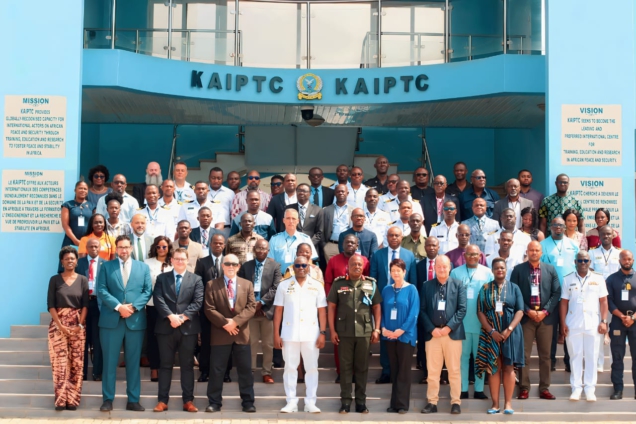Stakeholders in the maritime sector have called for concerted efforts and effective collaboration to address maritime insecurity in the Gulf of Guinea (GoG).
They said by working together, they would help ensure the safety of maritime trade, protect valuable resources and promote economic development in the GoG.
As a vast marine area of strategic importance, the stakeholders identified Illegal, Unreported and Unregulated (IUU) fishing, drug trafficking and armed smuggling to piracy and armed robbery at sea among others as some marine security challenges in the GoG.
The stakeholders, including academics, policymakers and maritime industry players among others, speaking at the opening of a two-day conference at the Kofi Annan International Peacekeeping Training Centre (KAIPTC) in Accra, called for renewed regional cooperation and collaboration to address the insecurity in the GoG.
In November 2022, under the framework of the Danish Peace and Stabilisation Fund’s Maritime Security Programme for the Gulf of Guinea (GoG), the Royal Danish Defence College (RDDC), KAIPTC, and SIGLA of Stellenbosch University held a trilateral conference on maritime security in the GoG.
The two-day conference is a sequel to the 2022 Programme as it focuses on maritime insecurity on the theme: “Maritime Security in the Gulf of Guinea: Fostering a Comprehensive Approach to a Complex Problem”.
Among others, the conference will address the most pressing maritime security issues in the Gulf of Guinea through the facilitation of knowledge sharing, dialogue with stakeholders from academia, industry, policymakers, and institutions.
The conference will examine several subthemes, such as the Yaoundé Code of Conduct, capacity development, illegal, unreported, and unregulated (IUU) fishing, cyber security, and women's participation in maritime security.
The stakeholders said even though there had been a drop in maritime piracy since 2022, it could not be narrowed down to a single line of effort, and that it was important to sustainably strengthen efforts, including effective collaboration, to achieve and sustain general maritime security over a wide field.
Rear Admiral Issah Adam Yakubu, Chief of Naval Staff in the Ghana Navy, said although other maritime security threats and challenges were equally important to the coastal states, piracy and armed robbery at sea had drawn the world’s attention due to their global impact.
He mentioned the issues of mutual trust, information sharing, interoperability, boundary delimitation and language barrier as some of the drawbacks to maritime security in the region, requiring a comprehensive approach to help achieve the Gulf of Guinea free of maritime crimes.
Rear Admiral Yakubu said, “The complexity of the problem…indicates that no individual country can single-handedly address maritime security challenges.”
“The sea’s seamless nature and the shipping industry’s multinational character require countries to cooperate to address maritime issues,” the Chief of Naval Staff stressed.
Major General Richard Addo Gyane, Commandant, KAIPTC, said despite the strides made in having “calm seas” in recent times, continuous work needed to be done to nip the insecurity in the Gulf of Guinea in the bud.
That, he said, called for a comprehensive and coordinated approach by all stakeholders with a shared vision of a safer and more resilient maritime environment to deal with the complex and multifaceted challenges.
He noted that since 2013, states within the GoG maritime space had redoubled their efforts at networking, sharing information and collaborating on maritime security issues, evident in the operationalisation of the Yaounde architecture processes.
Dr Michelle Nel, Vice Dean, Faculty of Military Science at Stellenbosch University, in her remarks, said the GoG with its abundant resources and vital trade routes, played a pivotal role in the global landscape, yet it was beset by maritime security threats affecting regional stability, economic prosperity, and global security.
She said the collective efforts would not only have a potential impact on the nations involved but also resonate across the continent influencing the safety and wellbeing of countless lives and livelihoods of local communities.
Professor Thomas Mandrup, Associate Professor at the Centre for Stabilisation Operations, Institute of Strategy and War Studies at the Danish Defence College, said addressing the complex maritime challenges requires deep understanding and genuine cooperation, moving beyond sovereignty and national interests to find transnational solutions.
“The Gulf of Guinea's security situation is a concern, with recent coups undermining trust and cooperation,” he said, adding that capacity building was vital but should prioritize sustainability and local ownership.
Prof. Mandrup called for a de-securitized maritime space, focusing on a holistic approach to protect populations and their interests.
Latest Stories
-
Concerned Youth of Asante calls for peaceful co-existence between Ghanaians and foreign nationals
16 minutes -
Minority slams Finance Minister over ‘shocking’ justification for sacking of over 1,000 workers
19 minutes -
IMF edges 2025 growth forecast slightly higher, warns tariff risks still dog outlook
22 minutes -
BoG printed money to pre‑finance GoldBod – Amin Adam
29 minutes -
Minority ‘exposes’ Finance Minister on misleading information in Mid-Year Budget presentation
29 minutes -
SeamlessHR and HRCC forge partnership for HR development in Ghana
32 minutes -
Joy FM kicks off ‘Sustainability Month’ on August 4 to tackle daily living challenges
39 minutes -
GCAA wins 2025 UG Corporate Football League
41 minutes -
Minority bemoans challenges faced by businesses over alleged Dollar shortages
46 minutes -
‘Cedi no apicki, but Abochi get the Dollar’ – Minority responds to claims on forex
53 minutes -
A/R Education office committed to zero tolerance for exam malpractice – Director
56 minutes -
Minority accuses government of claiming credit for NPP’s debt relief efforts
57 minutes -
NSMQ 2025: “Wind, Animals, Water!” – Osei Tutu SHS shouts their way into zonal semis after tie-breaker victory
60 minutes -
Latest Fitch upgrade reflected NPP legacy, not NDC gov’t’s doing – Minority
1 hour -
GIF condemns armed invasions of Forestry Commission offices, calls for urgent action
1 hour

